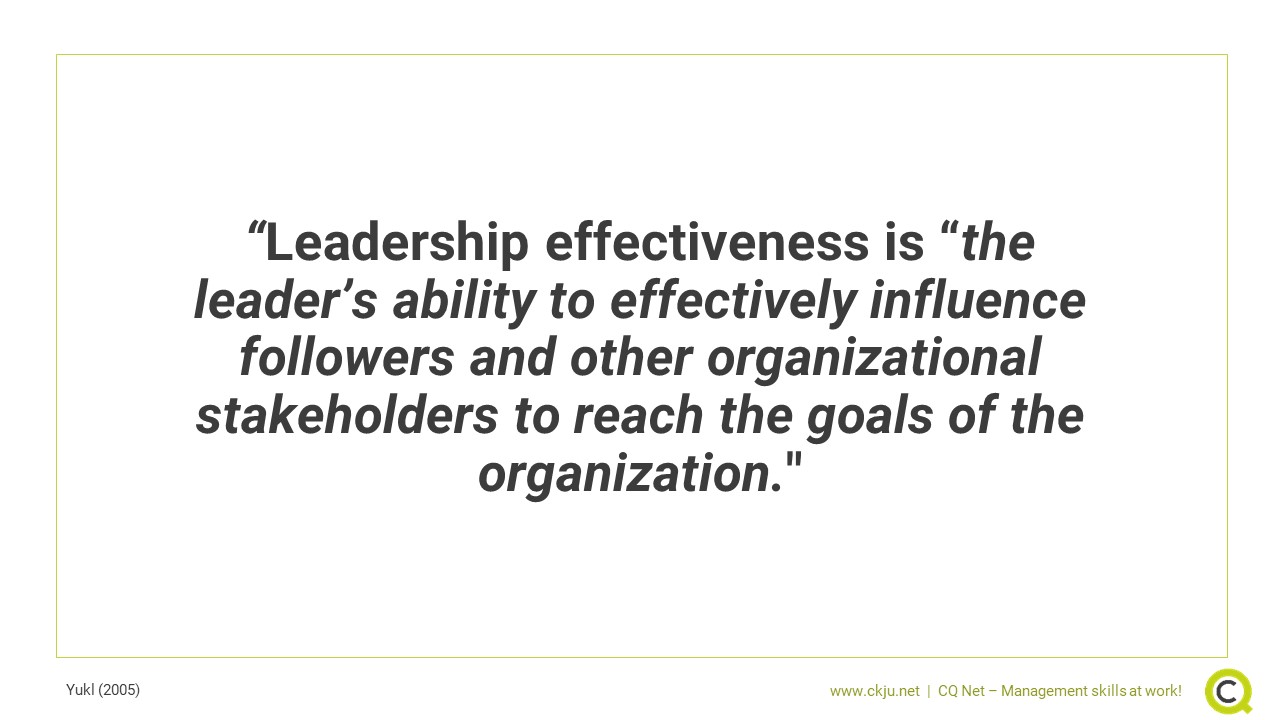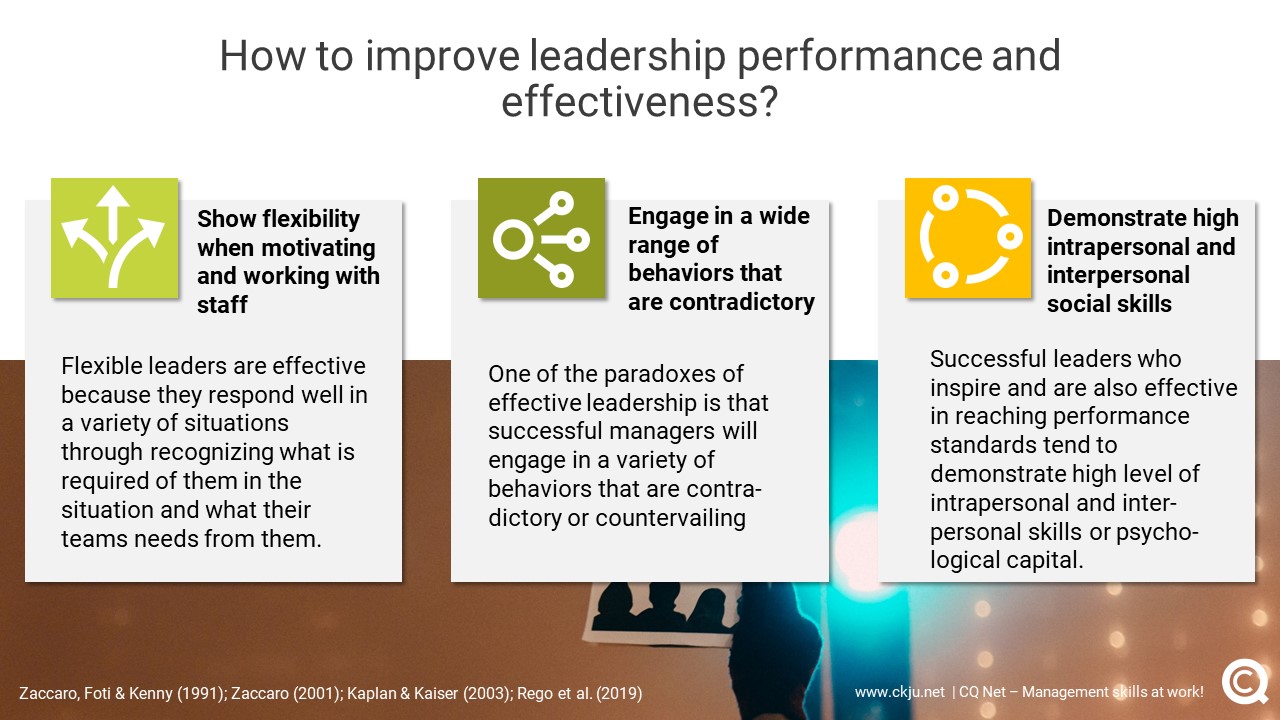- All Management Learning Resources
- Leadership performance

Why should you care about leadership performance and effectiveness?
There are several reasons why leadership performance and effectiveness matter to organizations. Research finds that leadership performance can be a catalyst for success or failure in an organization (Bennis & Nanus, 1985; Denison et al., 1995). Consequently, it is important that organizations identify individuals who can lead individuals and teams to be successful (Yukl, 2008). We will have a look at why leadership performance matters, how it works, its benefits and shortcomings and how you as a professional can improve your leadership performance.
Contents
- Why should you care about leadership performance and effectiveness?
- What is leadership performance and effectiveness?
- How does leadership performance and effectiveness work?
- How to measure leadership performance and effectiveness
- What are the benefits of leadership performance and effectiveness?
- What are the shortcomings of leadership performance and effectiveness?
- How to improve leadership performance and effectiveness?
- Critical appraisal of leadership performance: Solidity Rating 4
- Key recommendations for professionals
- References and further readings
What is leadership performance and effectiveness?
Research examining managers at both the senior and mid-level of the management tier can have an important effect on performance standards and outcomes (Yukl, 2008; Denison et al., 1995). Prominent leadership scholar Gary Yukl (2008) has argued that strategic leadership exhibited by senior executives such as CEOs can influence organizational effectiveness through behaviors such as efficiency, adaptation, and effective utilization of human capital.
Denison and colleagues have demonstrated that mid-level managers are effective and have an impact on performance through setting high standards and being a good role model (1995). Consequently, it is important to identify which factors are important in understanding why some leaders are more effective than others in predicting organizational performance.
Leadership effectiveness can be defined as “the leader’s ability to effectively influence followers and other organizational stakeholders to reach the goals of the organization" (Yukl, 2005). In defining leadership performance and effectiveness, Yukl states that it is important to determine how leaders influence employees to go beyond standard performance expectations or standards (Yukl, 2008).
How does leadership performance and effectiveness work?
Much of the empirical research has focused on the influence of charismatic or transformational leadership, mainly at the lower or mid-level of the organization (Yukl, 2008). This research is valuable and can help identify those leader behaviors that result in effective outcomes; however, there is also a need to examine how senior leaders can influence firm outcomes through a focus on strategic leadership (Yukl, 2008).
Yukl (2008) suggests that strategic leadership explains how top executive influence the organizational climate to determine the financial outcomes and survival of the firm. A focus on strategic leadership is important because senior leaders influence the strategic objectives of the firm and this can impact management systems, corporate culture, and the skills and motivation levels of employees (Yukl, 2008).
It is also important to consider what constitutes leadership performance and effectiveness at the lower levels of management. Managers who are successful tend to engage in a greater degree of behavioral complexity than low effectiveness managers (Dennison et al., 1995). Behavioral complexity occurs when managers engage and respond to situations that sometimes require opposing behaviors (Dennison et al., 1995).
For example, managers who demonstrate behavioral complexity will draw on a wide range of behaviors to suit the situation, so they are flexible in their approach. Leaders who display excellence in performance and effectiveness also display seven key roles including:
- Innovator-being innovative and creative;
- Broker-politically savvy and
- the ability to acquire resources through external social connections;
- producer-provides motivation to complete tasks;
- director-establishes objectives and goals;
- coordinator-provides structure through scheduling and problem solving, and
- monitor-provides continuity through distribution and performance checks.
How to measure leadership performance and effectiveness
There are several ways to measure leadership effectiveness. Many researchers focus on follower outcomes, such as subordinate or team performance. Yukl (2008) provides a taxonomy that can be utilized to create a measure that focuses on leader attributes utilizing the flexible leadership paradigm. It is recommended that when creating a measure or utilizing an existing measure, it is best to have a reliable and valid instrument.
What are the benefits of leadership performance and effectiveness?
Research has shown that when leaders are effective, this results in a range of positive outcomes.
Effective leadership has a moderate postive impact on financial performance
Senior management influence a firm’s financial performance (Yukl, 2008). Research has shown that chief executive officers can influence the financial performance of an organization and that this effect is of moderate magnitude (e.g., Giambatista, Rowe & Riaz, 2005); this effect might be even bigger if CEOs are given more discretion so there are less constraints (Yukl, 2008). For example, when organizations need to change due to external factors such as the current pandemic, CEOs can initiate new strategies that are effective (Yukl, 2008).
Effective leadership increase the capability of a firm’s human capital
At both the senior and middle-level, successful leaders influence human capital outputs. Research in strategic human resource management shows that when organizations invest in their employees, this results in improved organizational performance (e.g., Bowen & Ostroff, 2004). A firm that has employees who have the necessary knowledge, skills and attributes to be successful in their job can bring value to a firm (Yukl, 2008). Effective leaders can increase the capability of a firm’s human capital through increasing motivation and empowering employees so that employees draw on their resources to perform well.
What are the shortcomings of leadership performance and effectiveness?
The concept of leadership performance and effectiveness is used on a regular basis in practice and research. While it has a set of benefits, there are some shortcomings you should be aware of.
Effective leadership performance is difficult to measure
There is a plethora of ways to measure leadership performance yet there are few existing measures that capture the overall quality of effective leadership. As Yukl (2008) points out, most leadership research has focused on leader effectiveness in terms of a particular style e.g., transformational leadership. Moreover, most of this research has focused on mid-level managers and most research on CEOs has focused on strategy rather than the style of the leader. It is recommended that practitioners use measures that are valid and reliable yet also to tailor measures to suit a particular setting; it is possible for researchers and practitioners to create their own measure if it is valid and reliable.
Effective leadership performance is subjective
Most of the research on effective leadership has focused on using peer and/or subordinate ratings of the leader’s effectiveness (Yukl, 2008). While these are useful, they also can be inflated due to rater bias. In fact, in a study of flexible leadership, leaders who were able to balance between being directive and collaborative were rated as most effective by colleagues yet there was no relationship between this flexible style and team productivity (as rated by superiors) (Kaiser & Overfield, 2010). Moreover, more research is needed to explore how and why successful senior leaders influence a firm’s financial performance.
Leadership performance and success has modest effects on firm performance
Despite the importance of successful leadership in shaping and motivating employees to perform beyond expectations, there are other important factors that need to be considered. At best, successful leadership only has a moderate impact on the firm’s financial performance (Giambatista et al., 2005). Other factors such as the organizational culture and climate can impact individual team performance (Yukl, 2008).
In addition, there are situational factors such as government regulations and legislation that can impact how a firm operates; these are factors outside a leader’s control. As the global economy has witnessed the decline of jobs due to the automatization of many job roles, this type of technological advance can result in a firm’s decline and withdrawal from the market. Many of the studies on leadership effectiveness fail to take these factors into account because they are conducted at the mid-level management level (Yukl, 2008).
How to improve leadership performance and effectiveness?
Success in the workplace can be achieved when leaders engage in the following behaviors:
Show flexibility when motivating and working with staff
Flexible leaders are effective because they respond well in a variety of situations through recognizing what is required of them in the situation and what their teams needs from them (e.g., Zaccaro, Foti & Kenny, 1991).
In a study of 484 managers from several firms within the United States, co-workers (superiors, peers, and subordinates) rated the manager on the degree to which they were directive and collaborative (Kaiser & Overfield, 2010). The researchers found that managers who were flexible through being both directive and collaborative when it was appropriate to the situation were rated as most successful by their co-workers (r = .30 for perceived effectiveness, and r = .32 for team vitality).
Engage in a wide range of behaviors that are contradictory
One of the paradoxes of effective leadership is that successful managers will engage in a variety of behaviors that are contradictory or countervailing (Zaccaro, 2001). For example, an effective manager might show self-assertion and be direct through issuing instructions to staff, such as during a crisis; in other situations, the same manager, might be kind and considerate and empower their followers to be their best. These behaviors are contradictory yet are complimentary in that they help the organization and staff to be successful (Kaplan & Kaiser, 2003).
Demonstrate high intrapersonal and interpersonal social skills
Successful leaders who inspire and are also effective in reaching performance standards tend to demonstrate high level of intrapersonal and interpersonal skills or psychological capital. Leaders who demonstrate psychological capital have high self-efficacy, hope, optimism, and resilience. These qualities have been shown to be effective for individual performance and are also necessary when leaders seek to have successful team functioning (Rego et al., 2019).
It is important for organizations to select, train and develop leaders who have competencies that lead to successful employee performance. More research is needed to identify those overall core competencies at senior and mid-level management.
Critical appraisal of leadership performance: Solidity Rating 4
Based on the importance of leadership performance and success, this dossier is assigned a Level 4 rating (Based on a 1- 5 measurement scale). A level 4 is the second highest rating score for a dossier based on the available evidence supporting the concept of leadership performance and effectiveness. Leadership performance can impact the success of a firm.
Key recommendations for professionals
- Managers should engage in a range of behaviors and demonstrate flexibility.
- Managers should focus on being effective role models through being innovative, directive and considerate.
- Managers should consider what is required of them in the situation and in determining what their team needs.
- Managers can be contradictory in their behaviors if they are aligned with their values.
- Managers should develop a high range of intrapersonal and interpersonal social skills to effectively motivate staff.
References and further readings
Bennis, W. G., & Nanus, B. (1985). Leaders: The strategies for taking charge. New York: Harper & Row.
Bowen, D. E., & Ostroff, C. (2004). Understanding HRM-firm performance linkages: the role of the “strength” of the HRM system. Academy of Management Review, 29(2), 203−221.
Denison, D. R., Hooijberg, R., & Quinn, R. E. (1995). Paradox and performance: Toward a theory of behavioral complexity in managerial leadership. Organization Science, 6(5), 524–540
Giambatista, R., Rowe, W., & Riaz, S. (2005). Nothing succeeds like succession: A critical review of leader succession literature since 1994. Leadership Quarterly, 16, 963−991.
Kaiser, R.B, & Overfield, D. V. (2010). Assessing flexible leadership as a mastery of opposites. Consulting Psychology Journal, 62,2, 105–118.
Kaplan, R. E., & Kaiser, R. B. (2003). Rethinking a classic distinction in leadership: Implications for the assessment and development of executives. Consulting Psychology Journal: Practice and Research, 55, 15–25
Rego, A., Yam, K.C., Owens, B. P., Story, J. S. P, Pina e Cunha, M., Bluhm, D., & Lopes, M.P. (2019). Conveyed Leader PsyCap Predicting Leader Effectiveness Through Positive Energizing. Journal of Management, 45(4), 1689–1712.
Yukl, G. (2008). How leaders influence organizational effectiveness. The Leadership Quarterly, 19(6), 708–722.
Zaccaro, S. J. (2001). The nature of executive leadership: A conceptual and empirical analysis of success. Washington, DC: American Psychological Association
Zaccaro, S. J., Foti, R. J., & Kenny, D. A. (1991). Self-monitoring and trait-based variance in leadership: An investigation of leader flexibility across multiple group situations. Journal of Applied Psychology, 76, 308 –315.
About the Author








